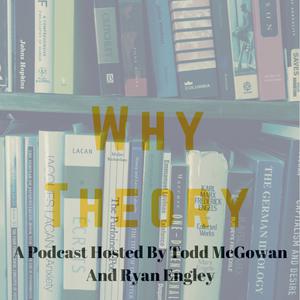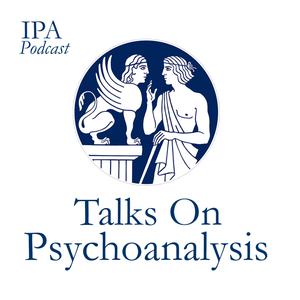
New Books in Psychoanalysis
Marshall Poe
Interviews with Scholars of Psychoanalysis about their New Books
- 1 hour 4 minutesCamille Robcis, "Disalienation: Politics, Philosophy, and Radical Psychiatry in Postwar France" (U Chicago Press, 2021)
On this episode, J.J. Mull interviews scholar and historian Camille Robcis. In her most recent book, Disalienation: Politics, Philosophy, and Radical Psychiatry in Postwar France (University of Chicago Press, 2021), Robcis grapples with the historical, intellectual, psychiatric and psychoanalytic meaning of institutional psychotherapy as articulated at Saint-Alban Hospital in France by exploring the movement’s key thinkers, including François Tosquelles, Frantz Fanon, Félix Guattari, and Michel Foucault. Anchored in the history of one hospital, Robcis's study draws on a wide geographic context—revolutionary Spain, occupied France, colonial Algeria, and beyond—and charts the movement's place within a broad political-economic landscape, from fascism to Stalinism to postwar capitalism.
J.J. Mull is a poet, training clinician, and graduate student at Smith College School for Social Work currently living in Northampton, MA. He can be reached at [email protected].
Learn more about your ad choices. Visit megaphone.fm/adchoices
Support our show by becoming a premium member! https://newbooksnetwork.supportingcast.fm/psychoanalysis
2 January 2025, 9:00 am - 1 hour 2 minutesFrederick Crews, "Freud: The Making of an Illusion" (Picador, 2018)
The figure of Sigmund Freud has captivated the Western imagination like few others. One hundred and twenty-five years after the publication of Studies on Hysteria, the good doctor from Vienna continues to stir controversy in institutions, academic circles, and nuclear households across the world.
Perhaps Freud’s sharpest and most adamant critic, Frederick Crews has been debating Freud’s legacy for over thirty years. His latest work, Freud: The Making of an Illusion (Picador, 2018) challenges us with an extensive psychological profile of the legend here revealed as scam artist. What some analysts might argue to be a 750 page character assassination, Crews maintains is simply a recitation of facts which leaves readers to draw their own conclusions. One might wonder if the story of facts that is conveyed is not itself a counter myth.
Was Freud a megalomaniacal, greedy, cocaine-addled opportunist and psychoanalysis a pseudoscience that has reigned tyrannically over twentieth century thought? Making use of Freud’s extensive letters to Martha Bernays, Crews paints a “damning portrait” (Esquire) of a money hungry, adulterous, and uncaring man.
How can this portrait be reconciled with the radically meaningful and deeply transformative process many of us know psychoanalysis to be? Is the tyranny of rationality preferable to the tyranny of myth? Does the unmaking of the myth of the man undo the gift of his work?
In this interview Crews responds to questions of what it means to have an empirical attitude, how we should “test” the process of healing, what’s so tempting about Freud, and what should become of psychoanalysis today. Meticulously researched, the Crews of the Freud wars is back again, and he’s going in for the kill shot.
Cassandra B. Seltman is a writer, psychoanalyst, and researcher in NYC. [email protected]
Learn more about your ad choices. Visit megaphone.fm/adchoices
Support our show by becoming a premium member! https://newbooksnetwork.supportingcast.fm/psychoanalysis
31 December 2024, 9:00 am - 38 minutes 32 secondsJames Baldwin’s Use of Mechanisms of Defense in this Story “Going to Meet the Man”
James Baldwin’s “Going to Meet the Man” is a powerful short story that describes the life of Jesse, a 42-year-old white police officer whose experiences alternate between his present-day struggles with impotence and his memories of racial violence. As the narrative unfolds a pivotal childhood memory of a lynching, sets the tone and comes to represent the fundamental weakness of white supremacy. His need for racist violence to regain potency suggests that the system of white supremacy requires constant reinforcement to maintain itself. Projective identification, a powerful mechanism of defense, also plays a significant role in exploring the complex psychological dynamics of racism and its impact on both the oppressor and the oppressed.
Dr. Karyne E. Messina is a psychologist and child, adolescent and adult psychoanalyst. In addition to maintaining a full-time private practice in Chevy Chase, Maryland, she is on the medical staff of Suburban Hospital in Bethesda, Maryland which is part of Johns Hopkins Medicine. She is a podcast host for the New Books Network and chair of the Department of Psychoanalytic Education’s (DPE) Scholarship and Writing section which is part of the American Psychoanalytic Association (APsA). She is a member of the AI Council of APsA (CAI). She has also written and edited seven books. Her topics focus on applying psychoanalytic ideas to real-world issues we all face in our complex world.
Dr. Felecia Powell-Williams is a child and adolescent supervising psychoanalyst at the Center for Psychoanalytic Studies in Houston, Texas, where she also holds the position of President of Board of Directors. Dr. Felecia Powell-Williams is also a faculty member in the Child and Adult Training Programs. In addition, she provides clinical supervision for the State of Texas licensing board, as well as supervision as a Registered Play Therapist-Supervisor with the Association for Play Therapy. She is also the chair of the Department of Psychoanalytic Education’s (DPE) Diversity section which is part of the American Psychoanalytic Association (APsA).
Learn more about your ad choices. Visit megaphone.fm/adchoices
Support our show by becoming a premium member! https://newbooksnetwork.supportingcast.fm/psychoanalysis
31 December 2024, 9:00 am - 1 hour 41 minutesDesy Safán-Gerard, "Chaos and Control: A Psychoanalytic Perspective on Unfolding Creative Minds" (Routledge, 2018)
In Chaos and Control: A Psychoanalytic Perspective on Unfolding Creative Minds (Routledge, 2018), psychoanalyst and painter Desy Safan-Gerard explores creativity, its psychodynamics, prerequisites, and possible blocks, and then engages in an extensive examination of her own creative work and process. Major themes include the importance of both accident and destructiveness for the creative artist. Included are meditations on some of the common biases and pitfalls in the analysis and therapy of creative people, the role of the accidental in creative work, the nature of creative blocks, passion and its absence, as well as the problem of being able to exercise one's freedom. The author describes the special needs of creative patients, the common problems arising in therapy, its solutions, and, most importantly, the analyst's distinctive role when dealing with such patients. She also probes into the role of narcissism, neurosis, and psychosis on creative work. Her examination of her own work includes detailed introspection into the psychological processes behind the creation and the meanings of various of her works, and one of the riches of the book is its inclusion of a great variety of reproductions of her paintings.
Akilesh Ayyar is a spiritual teacher and writer in New York. He can be reached at [email protected].
Learn more about your ad choices. Visit megaphone.fm/adchoices
Support our show by becoming a premium member! https://newbooksnetwork.supportingcast.fm/psychoanalysis
28 December 2024, 9:00 am - 1 hour 8 minutesRobert Caper, "Bion and Thoughts Too Deep for Words: Psychoanalysis, Suggestion, and the Language of the Unconscious" (Routledge, 2020)
Bion and Thoughts Too Deep for Words: Psychoanalysis, Suggestion, and the Language of the Unconscious (Routledge, 2020) is Robert Caper's most recent book, and it offers a sustained exploration and discussion of key problematics that have informed psychoanalysis since its inception. Caper offers a nuanced discussion of psychotherapy's tendency to fall into suggestion, and thus move away from an exploration of the truth, which he considers to be psychoanalysis's central task. The psychoanalyst has to mirror back to the patient who they are, rather than keep them in a state of blithe affirmation, and thereby inspire in them the notion that the therapist, like the analysand, is unwilling to explore what lies beneath the rubble of conscious beliefs and statements.
In his discussion of these matters, Caper draws on a wide range of thinkers, most importantly that of W.R. Bion, asserting that there are always "thoughts too big for words," which is a reminder that there is always more. He hightlights the importance of the aesthetic drawing on Meltzer, and he introduces a new distinction between maternal and paternal container.
I greatly enjoyed both reading the book and talking to Robert, and I happily recommend this book to anyone seeking to reconnect to psychoanalysis's foundations, utilizing the British school's key thinkers.
Learn more about your ad choices. Visit megaphone.fm/adchoices
Support our show by becoming a premium member! https://newbooksnetwork.supportingcast.fm/psychoanalysis
11 December 2024, 9:00 am - 1 hour 2 minutesKaryne E Messina, "A Psychoanalytic Study of Political Leadership in the United States and Russia: Searching for Truth" (Routledge, 2024)
A Psychoanalytic Study of Political Leadership in the United States and Russia: Searching for Truth (Routledge, 2024) provides psychoanalytic insight into the motives of this complex and contradictory topic.
The chapters written by the editor of this book focus on the importance of truth-telling and evidence as it relates to presidents of the United States. She studied the way in which some of these leaders have failed to tell the American people the truth about the Maddox incident, Abu Ghraib, the Iran-Contra affair, My Lai, and the real reasons why atomic bombs were detonated in Japan.
In the process of uncovering lies, over time this process has eroded trust in our leaders. She also explains epistemic trust which refers to the trust we place in others as sources of knowledge and information. It is a fundamental aspect of how we learn and understand the world, relying on the belief that the knowledge we receive from others is reliable and truthful. It plays a crucial role in various contexts, including education, science, with the media, and in everyday interpersonal interactions.
The other contributors, from different professional and academic backgrounds, use a range of methods including quantitative research and literary analysis to shed light on Putin’s background, outlook and current actions. Reflecting a range of perspectives on how Putin’s background may have informed his beliefs and his actions, particularly with respect to the invasion of Ukraine, the book brings together diverse viewpoints.
A Psychoanalytic Study of Political Leadership in the United States and Russia will be of great interest to psychoanalysts and to readers seeking to understand the complex dynamics of populist leadership.
Interview conducted by C.K. Westbrook.
Learn more about your ad choices. Visit megaphone.fm/adchoices
Support our show by becoming a premium member! https://newbooksnetwork.supportingcast.fm/psychoanalysis
8 December 2024, 9:00 am - 39 minutes 17 secondsHow Psychoanalytic Mechanisms of Defense Affected the 2024 Presidential Campaign and Election
Even though this is not a political show, today we will be talking about the ways in which mechanisms of defense effected both parties in the 2024 campaign and the presidential election. It is too big and too germane to our society to ignore. If we did, we might be guilty of denial.
In this podcast the hist and co-host discuss the following question and how mechanism of defense were employed to ward off difficult thoughts and feelings; some too frightening to contemplate.
Learn more about your ad choices. Visit megaphone.fm/adchoices
Support our show by becoming a premium member! https://newbooksnetwork.supportingcast.fm/psychoanalysis
1 December 2024, 9:00 am - 49 minutes 44 secondsEmily Dinova, "The Antagonist" (Bruce Scivally, 2024)
Today I spoke with Emily Dinova about her new novel The Antagonist (Bruce Scivally, 2024). Dinova, a psychoanalytic candidate working towards a license to practice psychoanalysis, wrote The Antagonist as a way of healing her own trauma. Written as a creative act of revenge, Dinova found herself in a fragmented state while writing the book. “I really feel like a fragmented part of myself wrote this book.” From this fragmented state she created characters who represent several psychoanalytic concepts including repression, negation, the uncanny, and Spotnitzian narcissistic object protection.
The structure of the novel is an enactment of Nachträglichkeit. I found the novel intoxicating and disorienting. It kept me happily off balance throughout. Rooted in the psychological adage that the urge to destroy does not have to be taught, Dinova renders her characters with layers of beguiling complexity. The horrors of this deeply informed psychological thriller unfold gradually. It is a masterful demonstration of unconscious processes.
Learn more about your ad choices. Visit megaphone.fm/adchoices
Support our show by becoming a premium member! https://newbooksnetwork.supportingcast.fm/psychoanalysis
20 November 2024, 9:00 am - 57 minutes 19 secondsSteven J. Sandage and Brad D. Strawn, "Spiritual Diversity in Psychotherapy: Engaging the Sacred in Clinical Practice" (APA, 2021)
Although once marginalized in the field of psychotherapy, spirituality and religion have now become established ethical considerations in clinical research and practice.
Drawing from diverse spiritual and religious backgrounds, this book offers clinical guidance for addressing a vast variety of traditions and complex diversity considerations in psychotherapy.
Spiritual Diversity in Psychotherapy: Engaging the Sacred in Clinical Practice (APA, 2021) uses strategies and in-depth case descriptions to serve as a guide for therapists and clinical professionals to effectively integrate spirituality and religion into clinical practice.
Learn more about your ad choices. Visit megaphone.fm/adchoices
Support our show by becoming a premium member! https://newbooksnetwork.supportingcast.fm/psychoanalysis
12 November 2024, 9:00 am - 1 hour 28 minutesAnneli Jefferson, "Are Mental Disorders Brain Disorders?" (Routledge, 2024)
The question of whether mental disorders are disorders of the brain has led to a long-running and controversial dispute within psychiatry, psychology and philosophy of mind and psychology. While recent work in neuroscience frequently tries to identify underlying brain dysfunction in mental disorders, detractors argue that labelling mental disorders as brain disorders is reductive and can result in harmful social effects.
Are Mental Disorders Brain Disorders? (Routledge, 2024) brings a much-needed philosophical perspective to bear on this important question. Anneli Jefferson argues that while there is widespread agreement on paradigmatic cases of brain disorder such as brain cancer, Parkinson's or Alzheimer’s dementia, there is far less clarity on what the general, defining characteristics of brain disorders are. She identifies influential notions of brain disorder and shows why these are problematic. On her own, alternative, account, what counts as dysfunctional at the level of the brain frequently depends on what counts as dysfunctional at the psychological level. On this notion of brain disorder, she argues, many of the consequences people often associate with the brain disorder label do not follow. She also explores the important practical question of how to deal with the fact that many people do draw unlicensed inferences about treatment, personal responsibility or etiology from the information that a condition is a brain disorder or involves brain dysfunction.
Learn more about your ad choices. Visit megaphone.fm/adchoices
Support our show by becoming a premium member! https://newbooksnetwork.supportingcast.fm/psychoanalysis
4 November 2024, 9:00 am - 1 hour 3 minutesStijn Vanheule, "Why Psychosis Is Not So Crazy: A Road Map to Hope and Recovery for Families and Caregivers" (Other Press, 2024)
Today I talked with Stijn Vanheule about Why Psychosis Is Not So Crazy: A Road Map to Hope and Recovery for Families and Caregivers (Other Press, 2024).
Are we all a little crazy? Roughly 15 percent of the population will have a psychotic experience, in which they lose contact with reality. Yet we often struggle to understand and talk about psychosis.
Drawing on his work in Lacanian psychoanalysis, Stijn Vanheule seeks to answer this question, which carries significant implications for mental health as a whole. With a combination of theory from Freud to Lacan, present-day research, and compelling examples from his own patients and well-known figures such as director David Lynch and artist Yayoi Kusama, he explores psychosis in an engaging way that can benefit those suffering from it as well as the people who care for and interact with them.
Learn more about your ad choices. Visit megaphone.fm/adchoices
Support our show by becoming a premium member! https://newbooksnetwork.supportingcast.fm/psychoanalysis
29 October 2024, 8:00 am - More Episodes? Get the App
Your feedback is valuable to us. Should you encounter any bugs, glitches, lack of functionality or other problems, please email us on [email protected] or join Moon.FM Telegram Group where you can talk directly to the dev team who are happy to answer any queries.
 Why Theory
Why Theory
 This Jungian Life Podcast
This Jungian Life Podcast
 Psychoanalysis On and Off the Couch
Psychoanalysis On and Off the Couch
 Talks On Psychoanalysis
Talks On Psychoanalysis
 Jungianthology Podcast
Jungianthology Podcast